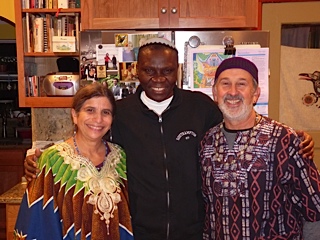
The Abayudaya are a tribe of roughly 1,000 Jewish Ugandans living in and around Mbale. Haven’t heard of them? Me either—until I recently got the opportunity to meet their leader, Aaron Kintu Moses, during a shabbaton at the P’nai Or of Portland. The event was sponsored by Kulana, a non-profit organization that works to support isolated and emerging Jewish communities around the world.
Moses’ visit came as part of a larger North American speaking tour, where he traveled the country meeting others in the Jewish community. P’nai Or of Portland, in particular, has taken on the Abayudaya as a tzedakah partner. “They’ve got all these amazing programs,” said P’nai Or congregant and shabbaton coordinator Joanie Levine. “I was so impressed by this tiny Jewish community, surrounded by Muslim and Christian families, that is making a huge effort to do interfaith projects.” One of these projects is a school system in Mbale, Uganda that is comprised of two interfaith schools to educate area students. Another is the formation of a bead bank for unemployed women.
The Abayudaya have a remarkable story. Their Jewish awakening started in 1919, with initial leader Semei Kakungulu’s conversion to the Jewish faith. The word “Abayudaya” means “People of Judah” in the Luganda language. Although the Abayudaya are geographically isolated from the larger Jewish world, they have found ways to connect spiritually with Judaism and the surrounding multifaith communities. According to P’nai Or Rabbah Debra Kolodny, this spirituality permeated the Portland shabbaton.
“When we were davvening (praying), using some Abayudaya melodies, this amazing, spontaneous prayer happened,” Kolodny said. “Everything was rich and connected and gorgeous. It was the heart of the best of what prayer can be—a spontaneous eruption. That prayer had the essence of the whole weekend in it; the relationship of the Abayudaya with Judaism is new, and rich, and joyful. They inspire us to connect with our own Judaism in a new way.”
However, Moses’ arrival was more than a call for funds—it gave something important to the attendees as well, according to Levine. “This shabbaton brought everything home,” Levine said. “Aaron was part of the services, singing and praying with us. It made the Abayudaya very real—nothing was abstract. This is as good as it gets in terms of doing something good for people so far away.”
This shabbaton brought a new appreciation to congregants for the lives of the Abayudaya. “The more we get out of our little shells, the more successful we can be in manifesting the call from Isaiah—to be a light to nations,” Kolodny said. “We can contribute more to the growth and meaning of Judaism in the world.”
